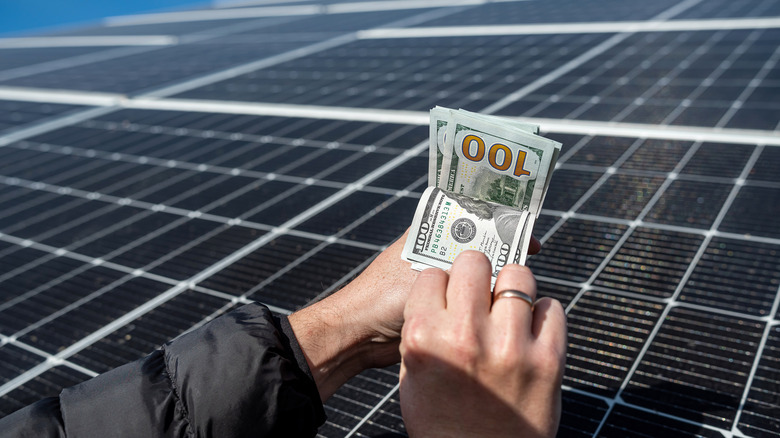Look Out For These Hidden Fees On Your Solar Panel Loan. It Could Save You Hundreds
Solar energy is a booming business, with more than three-quarters of all new electricity installations in 2025 being supplied by solar. As in any fast-growing industry, there are always companies eager to make a quick buck off of customers who aren't fully informed about the agreement they are signing. Adding solar panels to your home is a long-term investment, so it pays to read the fine print to make sure there aren't any hidden fees before you sign up. The Center for Responsible Lending calls these hidden fees "a standard practice" by lending agencies.
Hidden fees can include "dealer fees" baked into a loan's principle (meaning homeowners pay additional interest on it every year) rather than as a separate one-time charge. One of the biggest scams to watch for with solar panel installers is the promotion of government incentives for which you are not eligible. Look through the fine print to make sure those incentives aren't assumed in the loan agreement. If you don't qualify, you'll end up paying far more than you thought. Scammers might also try to sell you a more costly system, such as solar roof shingles, which may never pay for themselves over time.
Deceptive lending schemes are often perpetrated by door-to-door sales people using high-pressure sales tactics. Many national solar companies outsource their sales work to independent contractors who are paid on a commission-only basis, which can lead to increased pressure to ink a deal. Some states, including Nevada, Washington, and Utah, require solar salespeople to be employed by the solar installer rather than as independent contractors. Washington State's law also requires a printed copy of a signed contract, including any financial arrangements, which means you can (and should) ask for one.
How to shop around for a solar loan
Roughly 58% of homeowners who go solar use loans to finance their investment. They do so with the reasonable assumption that once they pay off their solar loan, the electricity that their solar panels produce will be essentially free (the utility company will likely still charge homeowners a monthly fee just for being connected to the electrical grid). But if a door-to-door salesperson offers a deal that sounds too good to be true, it probably is. It pays to shop around and speak with friends and neighbors who have already installed solar. Contact solar companies yourself, either directly or through EnergySage, to get competitive bids from multiple installers. Solar companies with solid reputations don't need to employ cold callers or door knockers.
It also pays to shop around for the loan itself. Compare offers from a solar installer with any home-improvement loan that your own bank or credit union may offer you. Paying your solar installer upfront with a check from your own lending institution may win you a cash discount, reducing your overall costs. Some government agencies, such as Energy Star, also offer financial assistance to homeowners making energy-efficient improvements (including adding solar panels) to a new or existing home. And be sure to get a fixed-rate loan, even if it might initially be more than a variable-rate loan. Electricity prices rose by 13% between 2022 and 2025 and are expected to continue to rise, according to the U.S. Energy Information Administration, so getting a fixed-rate loan insulates you from inevitable inflation. Financed correctly, a solar installation can increase a home's value and pay for itself in most instances. But that's the case only if you avoid hidden fees added by unscrupulous salespeople.

